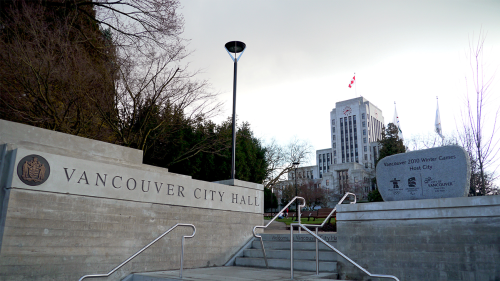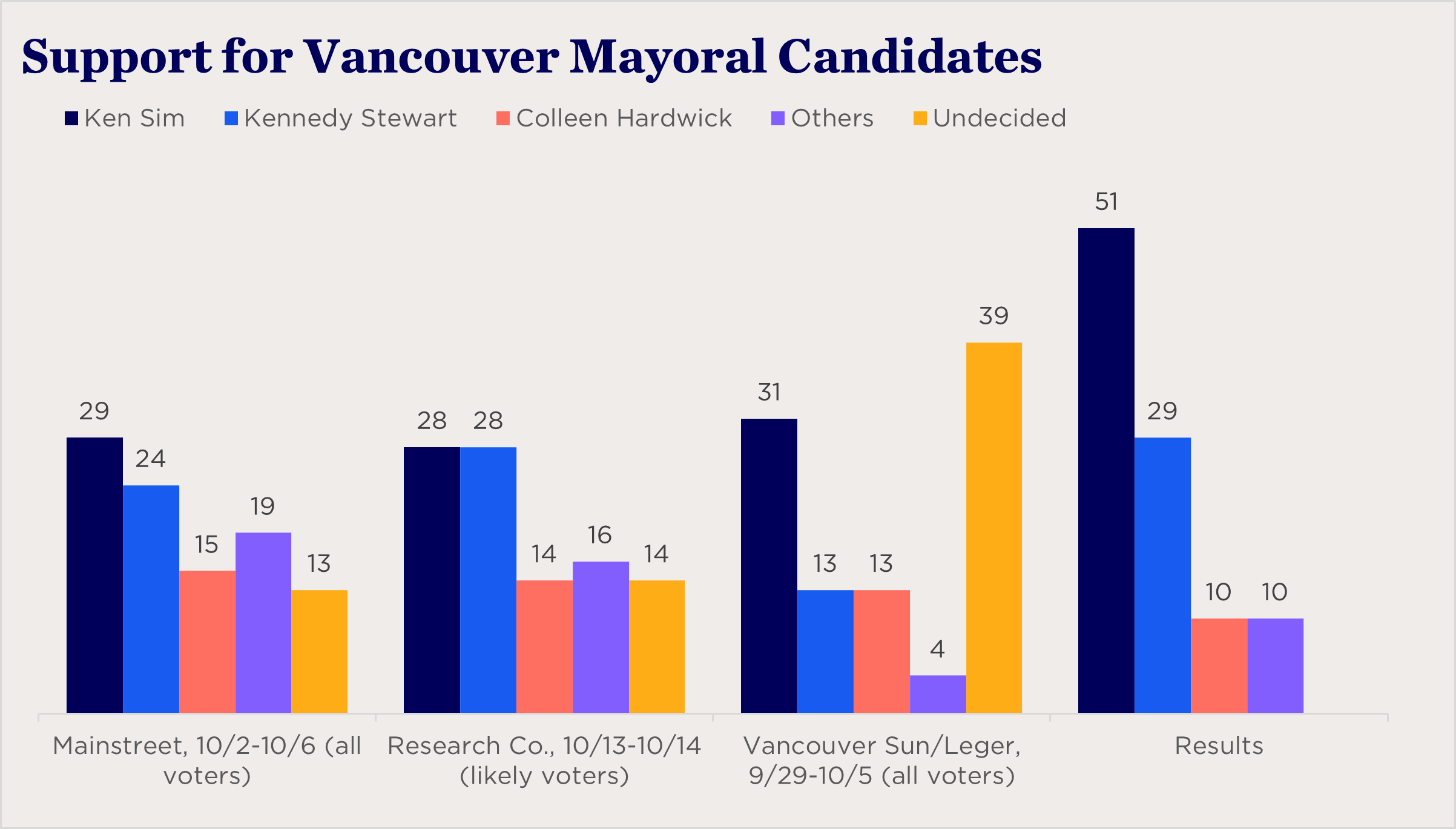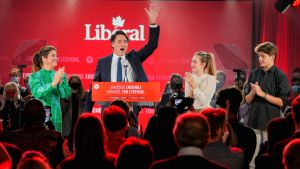Polling and a Political Earthquake in Vancouver

A center-right party’s landslide victory in one of North America’s most liberal cities offers a cautionary tale about polling in urban areas.
US President Joe Biden’s October visit to Oregon highlighted the surprisingly competitive gubernatorial contest and several congressional races in a reliably blue state. But to understand why Democratic leaders are concerned, it helps to look a few hundred miles north—to Vancouver, Canada.
There, Ken Sim, a businessman representing a center-right alliance, defeated Kennedy Stewart, the incumbent social democratic mayor, two weeks ago. Sim tapped into discontent over homelessness, policing, and education, promising to hire more police and reverse progressive education reforms. Sound familiar?
Notably, polls leading up to the election significantly underestimated center-right candidates’ strength. The three most recent nonpartisan polls conducted before the showed Sim with around 30 percent of voters’ support; the latest showed him in an effective tie against Stewart. Yet on Election Day, he won more than 50 percent of the vote, defeating Stewart by over 20 points.

This may be partially explained by late swings among undecided voters. As is typical for a municipal election, surveys recorded up to a third of voters as undecided. But in two of the three polls, even counting every undecided voter for Sim would have underestimated his support, suggesting wider issues or methodological biases. This gap is particularly surprising because the 2022 election was a rematch of the 2018 race between Sim and Stewart, when polls were closer to Sim’s vote share.
Nonresponse and sampling biases are potential explanations, and the electoral map may provide additional clues. Between 2018 and 2022, Sim increased his vote share most in the eastern and southeastern neighborhoods of Vancouver, which are home to the city’s densest concentrations of minority, recent immigrant, and lower-income voters—types of communities that have traditionally been more difficult for pollsters to reach.
These neighborhoods also have the highest proportion of residents who don’t speak English. In Victoria-Fraserview, where Sim improved his vote share by over 30 percentage points, nearly seven in 10 residents speak a native language other than English (69%). Sim, who will be Vancouver’s first nonwhite and Asian Canadian mayor, oversaw a robust campaign effort to reach these voters, including campaign advertising and platforms printed in Simplified and Traditional Chinese.
Sim’s significant increase in support from minority, immigrant, and lower-income neighborhoods echoes recent trends for moderate and conservative candidates in traditionally liberal North American cities. In New York, Black, Hispanic, and low-income voters helped Eric Adams defeat more liberal opponents in the Democratic mayoral primary. Asian Americans in San Francisco’s Chinatown helped power the recall of their progressive district attorney. And in Los Angeles, Rick Caruso is bidding to replicate Adams’ success through extensive advertising in Spanish and Asian-language media. If public opinion is not fully capturing these groups’ views, support for moderate and conservative candidates may be underestimated.
More broadly, many pollsters remain uncertain about why some polls underestimated President Donald Trump and other conservative candidates' support in 2020, and have made few adjustments to their methodologies. Liberal politicians in major cities may want to look north for a cautionary tale.
Like in New York, San Francisco, and Los Angeles, housing and homelessness, crime, and education topped Vancouverites’ concerns. Voters answered with a sharp repudiation of their political establishment. Sim’s “ABC Vancouver” party won commanding majorities on the City Council, park board, and school board. Stewart is the first incumbent to lose in 42 years, and his defeat concludes 14 consecutive years of leadership by mayors affiliated with Canada’s social-democratic New Democratic Party.
No election is a perfect bellwether, and the interpretation of international examples merits special caution. But if Vancouver is any guide, many voters in traditionally liberal cities harbor deep concerns about the direction of their communities. Polls may be underestimating their strength. As Americans vote this week, surprises could be in store.


Related Content
 Global Politics
Global Politics
After weeks of fierce campaigning, not much changed after Canada's snap election. What can the Trudeau government accomplish in a third term when it comes to foreign policy?
 Climate and the Environment
Climate and the Environment
"Notwithstanding China’s firm grip on global supply chains of critical minerals and rare earths, Canada can support a more predictable green transition."
 Global Cities
Global Cities
Brian Hanson talks with Penny Abeywardena and Henri-Paul Normandin about cities' diplomatic agendas.
